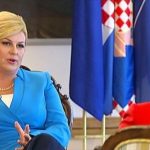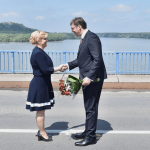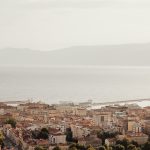ZAGREB, February 3, 2018 – Croatian President Kolinda Grabar-Kitarović said on Friday that she would talk sincerely and openly with Serbian President Aleksandar Vučić so that the outstanding issues between the two countries could be dealt with as soon as possible.
Vučić is expected to visit Zagreb on February 12-13, after a visit planned for last November was postponed.
Speaking on Croatian Radio, Grabar-Kitarović said the visit had been prepared for months, “even longer”. “When we postponed it last year, we wanted the conditions to be right to talk with the Serbian president about all outstanding issues between the two states in a calmer atmosphere, without tensions.”
“What we have seen in the past few days has indeed started to escalate to a verbal war between Croatia and Serbia. Very simply, I couldn’t allow that. I decided to put a stop to it. That’s my responsibility. That’s a statesman’s responsibility,” she said. She added that “in such a situation the easiest thing to do would be to look the other way, to postpone the visit again and do nothing, perhaps scoring political points along the way.”
“I’m aware of the political risk this brings. However, politicians who care about their rating aren’t good for the state. One should be a statesman who thinks about what they will do for their people and their state in the end.” She said that “the sooner the tensions are defused, the easier will it be to talk about those issues… I believe that the sooner we begin to talk about those issues, the sooner will the time come to resolve them.”
The President reiterated that for her “the issue of all issues is the search for the missing, for the people we are looking for, for our Croatian defenders, for civilians.” “I said the visit would be successful if the fate of even one person, even one Croatian defender and one civilian, is resolved.”
“We are going into that meeting with the intention to talk honestly, to tell each other what the problems are, and to try to come closer in resolving them. There’s a range of topics that need to be talked about,” she said.
The president said “Croatia and Serbia look differently on the past, on the 20th century… However, what we have to deal with are the consequences of that past, and that’s the missing, the many other issues resulting from the dissolution of the former state, such as the borderline, such as the archives and so on. I will be satisfied if we agree three to five elements on which we will start working immediately.”
“If you don’t talk, you won’t resolve problems… We mustn’t be enemy states,” said Grabar-Kitarović.
Asked if there had been pressure from the European Union and the United States that she meet with Vučić, she said, “No, absolutely not… There have never been pressures… It was left up to us and Serbia to start resolving those issues as responsible states. But… there’s a lot of support for this meeting, from the US and the EU, even from Russia, which has also welcomed that visit.”
“I believe and see by the reactions that a vast majority of both the Croatian and the Serbian people are tired of disputes from the past and wish us to embark on a better, more constructive future.”
Asked about Slovenian President Borut Pahor’s statement that, after the border arbitration ruling, Slovenia would no longer negotiate with Croatia on their border, she said, “I have always advocated dialogue in dealing with all outstanding issues between neighbours.”
“I see no other way out of the situation we have found ourselves in with Slovenia concerning the border issue but through talks and dialogue. There’s no way for one side to impose a solution on the other. That’s not only against the United Nations charter but also the principles of international law in general and, of course, the relations within the European Union and NATO, where we are allies,” said Grabar-Kitarović.









